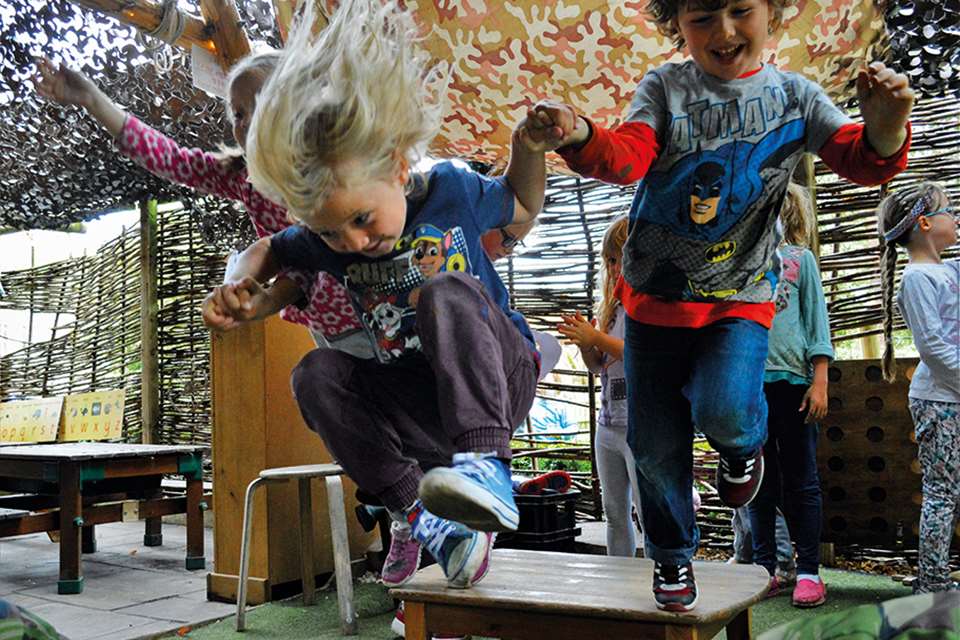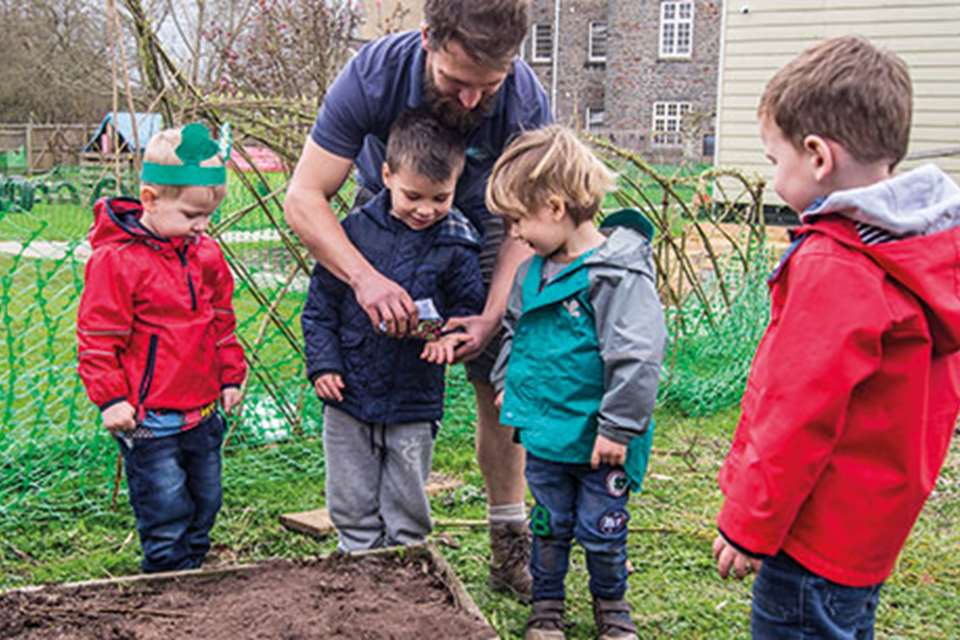A Unique Child: Health & Nutrition - On the MEND
Caroline Vollans
Monday, July 10, 2017
Community intervention programme MEND is helping families to be more positive about healthy eating and exercise. Caroline Vollans sees the programme in action in Westminster

In the 1990s, there was the problem of the ‘muesli belt middle-class’ children, who were fed too few carbohydrates and calories and ended up poorly nourished and underweight. Today, we face another problem of poor nourishment: children being greeted from nursery with large bags of crisps and huge quantities of fizzy drinks – this time ending up overweight.
Childhood obesity is rarely out of the media, with statistics constantly telling us how grave the situation is going to be for the health of our future generations and the NHS. At the same time, nutritional guidance regularly dominates the press and popular culture: what is good and not good for us to eat, the value of super-foods, and the benefits of food combining and reducing portion sizes.
This abundance of information seems only to have spread confusion about healthy eating, and done little to educate children about food and nutrition – as revealed in last month’s poll by the British Nutrition Foundation (BNF) for its Healthy Eating Week. Among its many alarming findings, the survey found that one in five young children believes that fish fingers are made from chicken; nearly a third of five- to seven-year-olds think that cheese comes from a plant; and just over one in five of older children believe that animals provide us with pasta.
One education programme seeking to address current problems of unhealthy lifestyles is MEND (Mind, Exercise, Nutrition, Do it). Run by social enterprise Mytime Active, MEND is a free family-based community intervention delivered by nutritionists, dieticians and exercise specialists. The programme is tailored to children’s ages and the needs of local communities, but the primary focus throughout is that of education in nutrition and exercise, with the aim of helping families to rethink their habits and feel confident about changing them where necessary.
MEND-MINI 
Among the courses on offer is MEND-mini, which is designed for two- to four-year-olds and their carers, and runs for an hour a week over six weeks. All activities throughout the hour are about engaging with exercise and exploring food.
This version of MEND is running for the second time at Dorothy Gardner Nursery and Children’s Centre in Westminster. The sessions are open to all children and their families to avoid targeting specific children and families and so prevent any stigmatisation that might occur. As well as children attending with their carer, some of the other children from nursery join in. One of the centre’s early years educators also takes part.
At the start of each session, everyone gathers together in the library space to greet each other and meet the two nutritionists andthe physical exercise lead.
The ambience, as everyone is gathering, is at one and the same time calm but lively – children and carers seeming to be relaxed and looking forward to their time. The session is composed of two parts.
Part one: exercise
The session begins on the football pitch across the road from the centre and starts with all carers, children and staff participating in a range of warm-up and circle games using different parts of the body – skipping, side-stepping, jogging, hopping, running, tip-toeing, little steps, big steps, fast steps, slow steps. As well as benefiting from the exercise itself, the children become more familiar with parts of their body and how they can move them. Integral to the session is the need to pay attention to instructions, listening and watching carefully as, suitably, it all runs at quite a pace.
None of the games are complicated or require expensive specialised equipment – they include versions of Traffic Lights, Duck Duck Goose, and Bump. The key aspect of this time is to get the children experiencing aerobic exercise in a fun and familiar way without much else to think about. And, indeed, it seems to work – in fact, they seem to relish it.
As a means of drawing the exercise session to an end, the group plays a few parachute games, which involves co-operation, with every person being significant if it is going to work well. As well as being a nice way to draw the group together, the games also help everyone wind down in preparation for returning indoors for the quieter part of the programme.
Part two: nutrition and food
Everyone returns to the library space, and again the activities on offer are both simple and inexpensive. Here, the goal is to introduce children to two new fruits or vegetables a week.
A picture book character, Sammy-Rae, is used to initiate and mediate thinking about food – the stories look at the character’s thoughts, concerns, uncertainties, questions, worries, interests and so on about food, especially new food.
Everyone in the group, adults and children alike, is then given a small bowl containing one piece of fruit – for instance a blueberry or slice of cucumber. There is then a five-step approach to exploring what is in front of them: look at it, touch it, smell it, kiss it and taste it. The children are not overly encouraged or cajoled into eating it, though – it is their choice. Seeing others try new food can, in itself, be useful.
As well as giving children the opportunity to explore a piece of fruit or veg, this activity is hugely rich in speech and language. The adults gently ask questions: What does it look like? What does it remind you of? What colour is it? What shape is it? What does it feel like? Is it hard, squidgy, prickly, rough, smooth, wet, dry?… and so on. It is all very relaxed – the questions and comments do not feel contrived and the children freely create their own responses:
- ‘It is the same colour as my top!’
- ‘It leaves a colour on my hands.’
- ‘This one is like a ball.’
- ‘The edges are green but the middle isn’t – it’s sort of white.’
The session ends with a song involving a ‘see you all next week’. There is an opportunity, too, after the sessions for the staff to offer guidance and advice in an informal way. The entire tone is non-threatening – nothing of the ‘nanny state’ dictating how parenting should and should not be done.
Family responses 
Parents and carers have been enthusiastic about the programme, with feedback including:
- ‘It’s always fun. I felt reluctant to come at first but it’s amazing now.’
- ‘It was very nice. I enjoyed it and my kids enjoyed it. The exercise was good for me too – I need to lose weight! The kids really learn from it too.’
- ‘We enjoyed it, especially the games we played together. They always explain things simply and the children understand. Sometimes, as a parent, it is hard to explain so it helps to hear them explaining. I can learn from it.’
- ‘Thefood activities were educating. It gives me ideas to use at home.’
The benefits, it seems, are numerous – that the activities are not complicated makes it possible to translate them into the home.
Challenges
While a challenge, Dorothy Gardner has had some success in encouraging parents to attend the programme, with the same families returning weekly, as well as new ones appearing. As with any short course, the main challenge is for the good work to continue once the sessions end. Its continuation at nursery should be possible, however, given that a member of staff took part in the programme and no expensive resources are required.
The greater challenge is targeting the families who have not attended the programme, and may need it most. If, however, activities such as those done in MEND-mini can be incorporated into the regular curriculum then this should, in part, deal with the problem.
It seems that tackling obesity and inactivity needs to become a core part of what we do in the early years, as it’s such a big challenge – it will not be enough to do it as an ‘extra’, or just for referred children.
MORE INFORMATION


